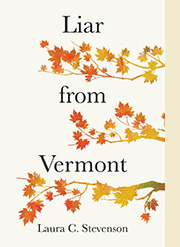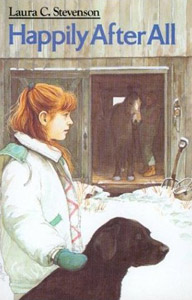A New Series: One Minute Reviews of
Books by Vermont Authors
Laura's column "One Minute Reviews" has appeared bi-weekly in Wilmington, Vermont's Deerfield Valley News since 2015. In April 2018, she found that no Vermont periodical consistently reviews all commercially published fiction and non-fiction by Vermont authors, so she started a series to fill that void. Published reviews from that series and some earlier reviews of local authors are listed with links to a scan of the printed copy. Reviews still in queue are listed without links until they appear in print.
The books reviewed in this series are available through Wilmington's Pettee Memorial Library, the Whitingham Free Public Library, and locally owned Bartleby's Books in Wilmington.
Deerfield Valley News, 9/22/2016
Local Writer Portrays The Other Vermont
Robin MacArthur, Half Wild: Stories. Ecco, 2016.
In this debut collection of skillfully-crafted short stories, Robin MacArthur, a third-generation member of the Marlboro MacArthur family, joins Howard Frank Mosher and Castle Freeman in portraying characters set in an intimately-known Vermont landscape. All eleven stories are set in the fictionalized environs of Marlboro, and readers with local knowledge will recognize such recurring road names as Stark, Butterfield, Augur Hole. They may, however, be less familiar with the culture that dominates the collection. While the term "half wild" is used to describe wolf-dog hybrids in the opening story, in a larger sense, it describes the ethos of the stories: a world that MacArthur deliberately contrasts with Vermont's image of pastoral loveliness and its tangential relationship with the American Dream. The characters hover on the edge of poverty. While they appreciate (with varying degrees of resentment and frustration) the beauty of the woods that surrounds them, they live in trailers or shacks, disintegrating farm houses whose pastures are going to scrub, or "collections of rooms" that have never quite evolved into houses. Their recreations are TV, drugs, beer, whiskey, and occasional parties in which everybody gets stoned or laid. And yet, their world has a hold on them, even when they leave. "There are two worlds I won't ever belong to," says the narrator of "The Women Where I'm From," who has returned from Seattle to visit her dying mother. "Home or any other."
MacArthur's stories relate "home," a freighted term in anybody's vocabulary, to the illusions and distortions with which her characters consider their histories. In one of the most deftly-written stories, "The Heart of the Woods," Sally, the daughter of a logger, wife of a real estate developer, briefly returns to her past as she drinks with her father at a bar. Gradually, the story weaves Sally's denial of her role in persuading her father's neighbors to sell their land cheaply with her equally denied experience of her father's abuse. Two other stories portray women from wealthy families who in their twenties come "back to the land," again contrasting their versions of reality with what is before them – in once case, a son who has joined the Marines in Afghanistan because his mother's belief in simplicity has made his college education unaffordable, in another, an aging hippie who is dying in the commune where she now lives alone, ignoring both her deteriorating condition and the deterioration of her farm. Then there is Vi, whose clear-sightedness contrasts strongly with the illusions of other narrators; her straightforward love for "her man" and perceptive acceptance of the passage of time colors her moving narrative of her husband's death. In all the stories, the past affects the present as failing farms are sold off and turned to vacation homes; and yet only Vi can accept change as a natural process and look at it without fear.
To read MacArthur's collection straight through is to do it a disservice, because the stories' superficial likenesses (all narrated in the first person, all but three in the present tense, all but two by women) make them merge in the memory and may lead habitual novel-readers to unjustly anticipate a development that is not forthcoming. Read the way short stories are meant to be read – thoughtfully, one at a sitting, over a period of time – the collection reveals meticulous craftsmanship that enhances MacArthur's compassionate portrayal of her characters and the landscape that both beguiles and imprisons them.


